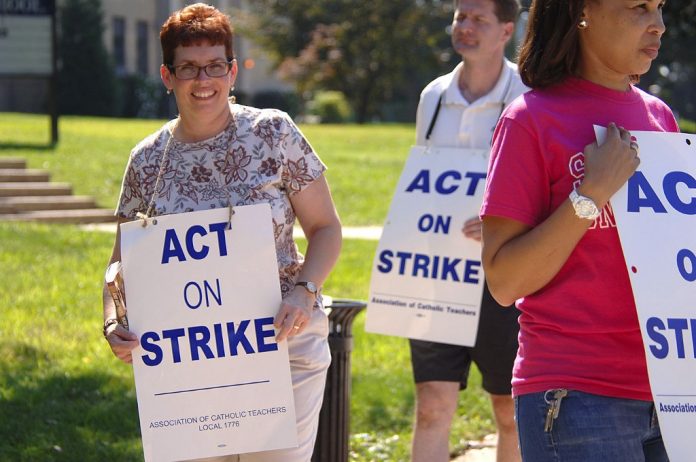Archdiocese of Philadelphia high schools opened last week with lay teachers walking a picket line, and both sides were continuing negotiations as the Times went to press on Tuesday.
Schools were open for a week, with non-union religious and administration staff members working with the students.
But sixteen of the 17 archdiocesan schools were closed as of Wednesday. Archbishop Wood, in Warminster, stayed open an extra day because it lost a day last week due to flooding.
The archdiocese said the missed days will be made up, but it hopes to avoid extending the school year.
According to the Office of Catholic Education, the stumbling block is what it calls “21st-century education reform.”
In the view of the Association of Catholic Teachers, Local 1776, the archdiocese is threatening job security, particularly for veteran teachers.
“After blood, sweat and tears for so many years, it’s like we don’t count,” said Spanish teacher Mary Jones, the union representative at Father Judge. “You really have no stability.”
However, superintendent Mary Rochford and chief negotiator Theresa Ryan-Szott said in a media conference call on Tuesday that the traditional “bumping” provision will remain in the contract.
Thus, veteran teachers would likely find employment if their school closed.
“All of those teachers would be picking spots at another school,” Ryan-Szott said.
The archdiocese’s chief negotiator said no more than a half-dozen issues are outstanding, though she wouldn’t specify them. The archdiocesan negotiating team had been “disappointed” that Local 1776 continued to ask for a 14.5-percent salary increase over three years. The union has lowered its salary increase request to an undisclosed figure.
The archdiocese is offering 7.84 percent over three years, a number Rochford labeled “very generous.” The superintendent noted that, in a tuition-based system, salary increases lead to tuition increases that lead to some parents finding Catholic education not affordable.
The union insists that other issues are more prominent.
“This one is about working conditions and work rules. It’s not about money at all,” said theology teacher Bob Zingle, the union representative at St. Hubert.
The archdiocese argues that it is addressing concerns about job security while maintaining academic priorities. It claims to be receiving support from parents and school administrators.
Attendance was reported at 94 percent when schools were in session during the strike. When schools opened last week, students completed orientation programs. Standardized testing, which had been scheduled for later in the month, was to be administered to freshmen and sophomores this week.
Parents are being asked to check archphila.org for updated information.
About 16,500 students attend the 17 archdiocesan high schools in the five-county Philadelphia region. Some 800 lay teachers are on strike.
Zingle, who has spent his entire 37-year career at St. Hubert, described the goings-on inside the schools as “housekeeping.” Besides testing, he said, students have been attending Mass and assemblies.
This is the fourth time in his career that the union has gone on strike. At a time of dwindling enrollment and rumored school closings, it’s likely some teaching positions will be eliminated in the future.
At present, seniority reigns. So, when North Catholic and Cardinal Dougherty closed in June 2010, the veteran teachers at those schools were able to find work at other archdiocesan schools.
At St. Hubert, there are more than 700 students and 31 lay teachers. The students have been supportive, their teachers say.
Union members agree they’d rather be inside, not outside, the school buildings. “We’re in the business of teaching kids and we want to be in the classroom,” Zingle said.
Still, the vote to strike was overwhelming. “Morale is great. We’re holding strong,” said Jones, the union rep at Judge. “We’re in it for the long haul, if necessary.”
In 2003, when schools closed during a two-week strike, money and health care were the major points of disagreement. Teachers went back to work, but only after narrowly passing the proposed agreement.
At Judge, students had been mingling with teachers, who encouraged them to go inside. Some motorists passing by have been honking in support.
The 60 teachers have been picketing in three-hour shifts during the morning and early afternoon, fortified by coffee, bagels, cookies and other treats.
At Archbishop Ryan, about 80 lay teachers are walking the picket line.
Paul Pedlow has taught English for 47 years, spending his first nine years at Judge before moving to Ryan. He’s the acting union representative and recalls Local 1776 negotiating its first contract in 1968.
Pedlow and other union members oppose proposals that would lengthen the school day and year, add responsibilities to department chairs and change the method of evaluation and ways lesson plans are designed.
The veteran educator said it’s a myth that a teacher’s day ends when he or she walks out the door.
“Nothing could be further from the truth,” he said, noting the nightly work done at home and in the late summer preparing for the first day of school. ••





